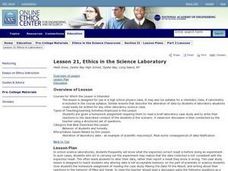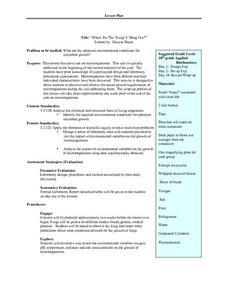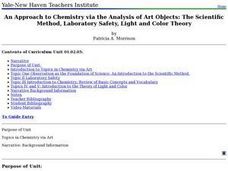Curated OER
From Polymers to Bioplastics: Looking Toward Finding Renewable Resources
Students investigate the properties of polymers. In this chemistry lesson, students explain the importance of energy sources. They produce a bioplastic from the lab and evaluate its structural integrity.
Curated OER
I Wood if I Could
Tenth graders investigate the process of how specific products are made from trees. For this chemistry lesson, groups of students must choose among ice cream, bubble gum, paper, toothpaste and lipstick. They research, design and...
Curated OER
Chemical and Physical Properties
In this chemistry worksheet, students pick objects from the home and test the chemical and physical properties of what it is made of.
Curated OER
Potato Chips Fragility
Students investigate why some potato chips crumple faster than others. In this physics lessons, students relate the cooking time to potato's fragility. They write a lab report about their findings.
Curated OER
Ethics in the Science Laboratory
Students consider the role of ethics in science lab procedures. In this ethics instructional activity, students explore a scenario that requires them to record their reactions to the case and the conduct of students in the case who alter...
Curated OER
Lesson 2, Student and Teacher Behaviors in Science
Young scholars explore ethics. In this science ethics lesson, students examine science lab classroom ethics as they consider various scenarios that encourage authentic student discussion and the formulation of guidelines and principles.
Curated OER
Acid Rain
Students investigate the effects of acid rain. The lesson contains a lab background for the teacher to use before the implementation of the lesson. They conduct an experiment to collect data and then report the results of the observations.
Curated OER
Applying Scientific Method to Analyzing
Students review the scientific method and basic lab skills, and practice how chemical employees work in teams to follow the scientific method. Students learn about various job requirements and responsibilities in the chemical industry.
Curated OER
Straw Chromatography
Students separate food coloring using liquid chromatography. In this chemistry instructional activity, students explain the effects of different solvents on the rate of separation.
Curated OER
Ranking Salinity
Students explain the uses of titration in chemistry and in industry. In this chemistry lesson, students determine the concentration of an unknown solution using titration. They calculate the percent of salt in saline solutions.
Curated OER
To Smell or Not to Smell, That is the Ester
Young scholars explain the basic concepts of polymerization. Students participate in a lab to create a crude preparation of carboxyl esterase and test its effectiveness in reducing the residual monomer in an emulsion such as paint.
Curated OER
Chemical and Physical Changes
Eighth graders investigate different gas behaviors. In this chemistry lesson, 8th graders describe how changing volume and temperature affect gas particles motion. They collect data and make a generalization about these variables'...
Curated OER
Chromatography
Learners conduct various experiments on chromatography. In this chemistry lesson plan, students distinguish among the different types of chromatography methods. They explain how the stationary and mobile phase interact with each other.
Curated OER
"Where Do The 'Fungi's' Hang Out?"
Tenth graders engage in a lesson looking for the ideal conditions for microbial growth. The lesson is to be given once they have background knowledge about microbes. Students set up a lab in order to grow cultures over a period of two...
Curated OER
It is a Crash Test, Dummy
Students research air bags on the Internet and use the information to design their own version of an air bag. After exploring the benefits and dangers of air bags students perform a chemistry lab in which they mix baking soda and vinegar...
Curated OER
An Approach to Chemistry via the Analysis of Art Objects: The Scientific Method, Laboratory Safety, Light and Color Theory
Students create a painting that clearly exemplifies the use of primary pigments to make secondary pigments. They demonstrate the distinction between value and saturation. They explain the affect of adjacent colors on each other and...
Curated OER
Endothermic and Exothermic Lab
In this endothermic and exothermic reactions learning exercise, high schoolers experiment with water and a salt of choice to determine if heat is absorbed or released in the reaction. Students take the temperature of their solution over...
Curated OER
Density Lab
Students find the density of two substances. In this density lesson plan, students determine the density of water and ethyl alcohol and compare their densities. They enter their data into the computer to produce a class compiled graph....
Curated OER
H2O2 Decomposition Lab II
Students conduct an oxidation experiment in which they must determine how much hydrogen peroxide (H2O2) is actually in a store-bought solution of H2O2.
Curated OER
Periodic Properties Lab
Students investigate the periodic properties of elements in the periodic table. In this periodic properties lesson plan, students experiment with elements from the Alkaline Earth Metals, the Halogens, the Transition Metals, and for extra...
Curated OER
Understanding Chemical Reactions Lesson: Bonds and Energy
What is required to get a chemical reaction? Chemistry learners find out by viewing this slide show. They will be able to compare endothermic and exothermic reactions, as well as draw energy level diagrams for each. A lab activity is...
Curated OER
Acids and Alkalis
This PowerPoint progresses slide-by-slide through all the facts you would want to deliver about acids, alkalis, salts, and the related lab tests. Each slide has one or two facts about a physical or chemical property or behavior. The...
Curated OER
Ocean Absorption Lab
Students examine various techniques that can reduce carbon dioxide in the atmosphere, and use chemistry to simulate oceanic sequestration. They conduct an experiment involving the method of oceanic absorption for carbon sequestration,...
Curated OER
Geo Sequestration Lab
Students explore geologic sequestration as a technique used to reduce carbon dioxide in the atmosphere. They use chemistry to stimulate oil mining. Students conduct an experiment to learn about geo carbon sequestration.
Other popular searches
- Acid Base Chemistry Labs
- Chemistry Labs of Hydrates
- High School Chemistry Labs
- Christmas Chemistry Labs
- Thermo Chemistry Labs
- Holiday Chemistry Labs
- Introduction Chemistry Labs
- Therm Chemistry Labs
- Online Chemistry Labs
- Chemistry Labs With Candy

























